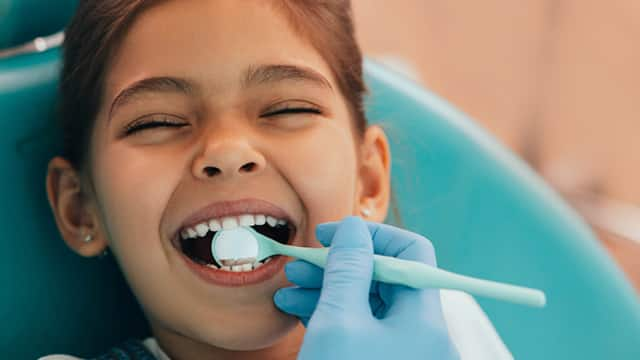Causes of Yellow Teeth in Kids
The American Academy of Pediatrics (AAP) explains that it's normal for permanent teeth to be less white than baby teeth. That's because baby teeth have thinner, whiter enamel than the permanent teeth that replace them. Your child's permanent teeth may look slightly yellow compared with the baby teeth that still remain in their mouth.
Beyond the natural difference in color, some tooth development disorders may cause yellow tooth discoloration:
Enamel Hypoplasia
This condition may result in missing or thin enamel, as an article published in the Indian Journal of Dentistry explains, and it can have many causes, including trauma to the baby teeth. Children with enamel hypoplasia could have yellowish or brownish discoloration of their permanent teeth.Amelogenesis Imperfecta
The National Institutes of Health states that this tooth development disorder may cause yellow teeth in kids. This genetic disorder results in soft, thin tooth enamel, so children with amelogenesis imperfecta can appear to have yellow teeth that can be damaged easily.Medications
Certain medications may also cause tooth discoloration, notes the New Zealand Medicines and Medical Devices Safety Authority. When children younger than 8 years old take tetracycline antibiotics, the medication may deposit in their developing teeth, staining the permanent teeth's inner structures. Other types of antibiotics, such as penicillin, have also been reported to cause stains on tooth enamel, which may appear yellow, brown or gray.
Poor Oral Hygiene
In some cases, as the Cleveland Clinic explains, tooth discoloration is simply caused by poor dental hygiene. When kids don't brush and floss thoroughly, plaque and stain-producing foods can accumulate on their teeth, which may result in discoloration.
Treatment for Yellow Teeth in Kids
If your child's teeth are yellow, take them to a pediatric dentist for an evaluation. After determining the cause of the discoloration, the dentist may recommend an appropriate treatment plan. These treatments may include microabrasion, tooth whitening or the placement of cosmetic restorations, such as crowns, according to the American Academy of Pediatric Dentistry (AAPD).
Over-the-counter teeth whitening products are popular with adults, and parents may wonder if they're safe for children. As the AAP notes, pediatric dentists generally recommend waiting to begin whitening treatments until all the baby teeth have fallen out. You can discuss whitening treatments with your child's dentist at their routine checkups.
Encouraging Good Oral Hygiene Habits
To help keep your child's teeth white and healthy, encourage them to follow a good oral hygiene routine. Children need to brush their teeth for two minutes twice a day, just like adults. The AAPD recommends supervising them until they are 7 or 8 years old. As soon as their teeth are touching, it's time to add a once-daily flossing routine.
Children may not be eager to brush and floss their teeth, but the ADA notes that sticking to a consistent routine can help make the habit last. Set the example by brushing and flossing your own teeth everyday. To make brushing more fun, you can have your child choose a character toothbrush and a kid-friendly fluoride toothpaste. You may even choose to give your child small rewards, such as stickers, to encourage their good oral hygiene habits.
If you're concerned about the color of your child's permanent teeth, take them to a pediatric dentist for an examination. Their permanent teeth may just appear yellow in contrast to their naturally whiter baby teeth, or they may be discolored due to other conditions.
Oral Care Center articles are reviewed by an oral health medical professional. This information is for educational purposes only. This content is not intended to be a substitute for professional medical advice, diagnosis or treatment. Always seek the advice of your dentist, physician or other qualified healthcare provider.
ORAL HEALTH QUIZ
What's behind your smile?
Take our Oral Health assessment to get the most from your oral care routine
ORAL HEALTH QUIZ
What's behind your smile?
Take our Oral Health assessment to get the most from your oral care routine














